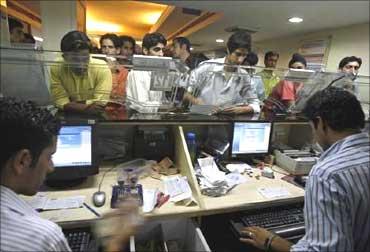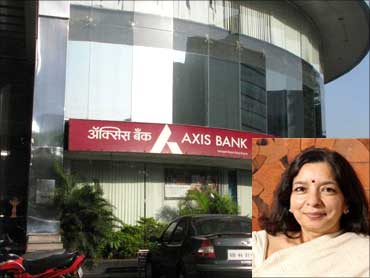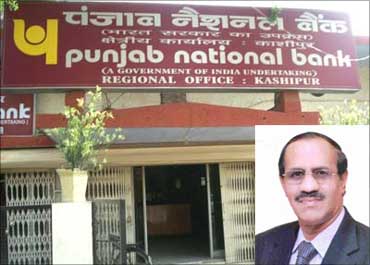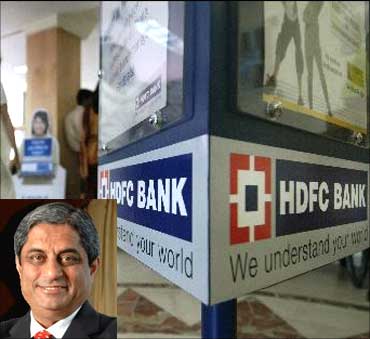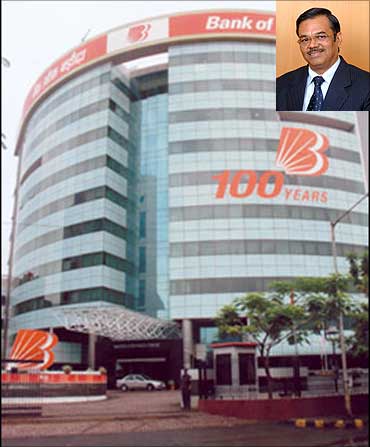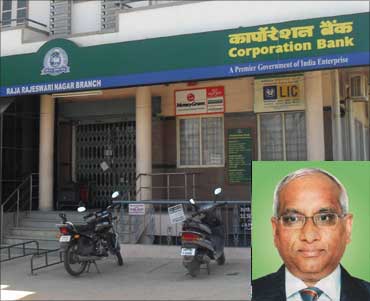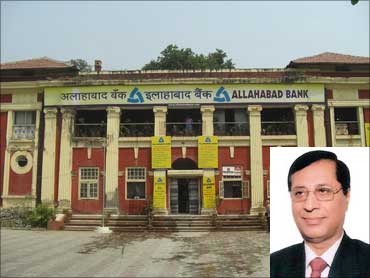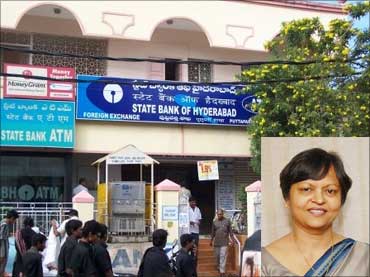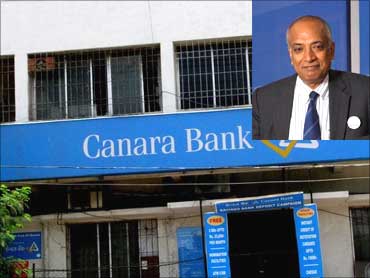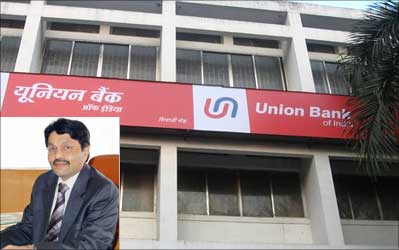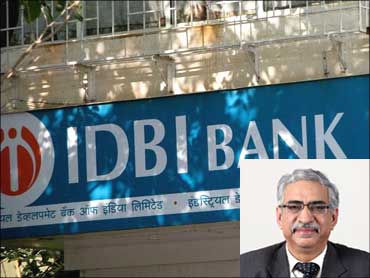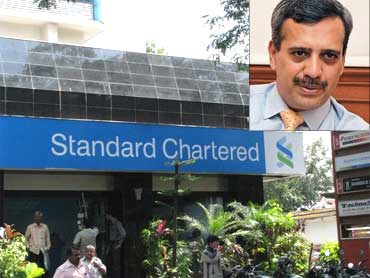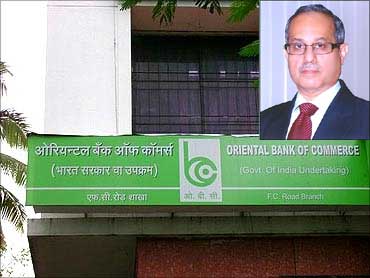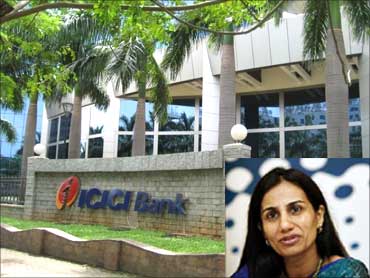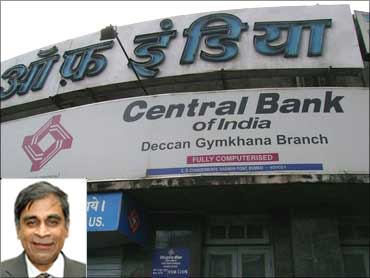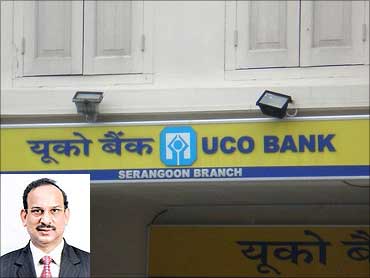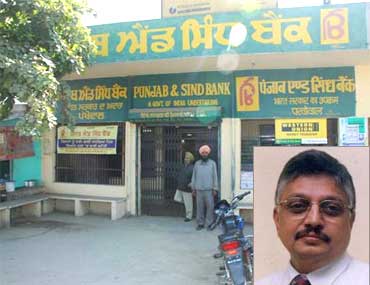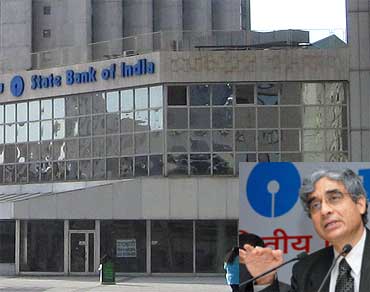 | « Back to article | Print this article |
The 20 best banks in India
Indian banks successfully weathered the mayhem that shook the financial world in 2008 and most of 2009 and 2010. Between 2001 and 2010, India's banking industry grew by a whopping 18 per cent -- from $250 billion to $1.3 trillion, on a cumulative basis.
The Indian banking industry added about 15,000 branches and 40,000 ATMs, besides initiating several banking reforms.
Financial magazine Business Today and global consulting firm KPMG recently published a list of India's best banks. The study was first conducted in 1993. Interestingly, while only MNC banks featured among the top 10 in that list, this year all the toppers are of Indian origin.
Please take the poll at the end of the slide show, and select the bank that you feel is the best.
BT-KPMG arrived at the composite rank of each bank by combining its ranks on each of the 26 parameters: Deposits ( both 1-year growth and 3-year growth); loans and advances (both 1-year growth and 3-year growth); fee income (1-year growth and 3-year growth); operating profit (1-year growth and 3-year growth); increase in market share (deposits and CASA); deposits; operating profit; balance sheet; total NPA growth rate; NPA coverage; Net NPA/Net advances; cost/income ration (%); cost/average asset ration; operating profit/employee; change in return on assets; increase in operating profit/total income; return on assets; fee income/total income; ROCE; Net interest income/AWF, and capital adequacy ratio
While all the 20 banks are 'large banks' (balance sheet size greater tha Rs 50,000 crore), rankings of medium and small banks are also being mentioned to give the presentation a complete picture.
Click NEXT to know about the 20 best banks in India . . .
The 20 best banks in India
Rank 1: Axis Bank
Formerly UTI Bank, Axis Bank is a financial services firm that began operations in 1994, after the Government of India allowed new private banks to be established.
The bank was promoted jointly by the Administrator of the Specified Undertaking of the Unit Trust of India, Life Insurance Corporation of India, General Insurance Corporation, National Insurance Company, The New India Assurance Company, The Oriental Insurance Corporation and United India Insurance.
The bank changed its name to Axis Bank in April 2007 to avoid confusion.
The bank's registered office is at Ahmedabad and its central office is located at Mumbai.
At the end of September 2010, the bank has a very wide network of more than 1,095 branches and over 4,846 ATMs.
The BT-KPMG study ranks Axix Bank as the best bank in India based on the 26 pre-determined parameters.
Midsize banks (Balance sheet size less that Rs 50,000 crore and more than 10 brances):
Rank 1: YES Bank.
Small banks (Baance sheet size greater than Rs 3,000 crore with fewe than 10 branches):
Rank 1: DBS Bank.
Very small banks (Balance sheet size less tha Rs 3,000 crore with fewer than 10 branches):
Rank 1: Shinhan.
Click on NEXT to read more...
The 20 best banks in India
Rank 2: Punjab National Bank
Punjab National Bank is the third largest bank in India.
It was registered on May 19, 1894 under the Indian Companies Act with its office in Anarkali Bazaar, Lahore.
Today, the bank is the second largest state owned commercial bank in India with about 5,000 branches across 764 cities.
PNB has a banking subsidiary in the UK, as well as branches in Hong Kong, Dubai and Kabul, and representative offices in Almaty, Dubai, Oslo, and Shanghai.
Midsize banks:
Rank 2: Kotak Bank.
Small banks:
Rank 2: Scotia Bank.
Very small banks:
Rank 2: Mashreqbank PSC.
Click on NEXT to read more...
The 20 best banks in India
Rank 3: HDFC Bank
HDFC Bank is a major Indian financial services company incorporated in August 1994, after the Reserve Bank of India allowed establishing private sector banks.
The bank was promoted by the Housing Development Finance Corporation.
HDFC Bank has over 1,725 branches and 4,232 ATMs, in 779 cities in India, and all branches of the bank are linked on an online real-time basis.
Midsize banks:
Rank 3: Jammu and Kashmir Bank.
Small banks:
Rank 3: BNP Paribas.
Very small banks:
Rank 3: Oman International Bank SAOG.
Click on NEXT to read more...
The 20 best banks in India
Rank 4: Bank of Baroda
Bank of Baroda is the third largest bank in India, after the State Bank of India and the Punjab National Bank and ahead of ICICI Bank.
BoB has a network of over 3,000 branches and offices, and about 1,100 ATMs.
As of August 2010, the bank has 78 branches abroad and by the end of FY11 this number should climb to 90.
In 2010, BOB opened a branch in Auckland, New Zealand, and its tenth branch in the United Kingdom.
The Maharajah of Baroda, Sir Sayajirao Gaekwad III, founded the bank on July 20, 1908 in the princely state of Baroda, in Gujarat.
The bank, along with 13 other major commercial banks of India, was nationalised on July 19, 1969, by the Government of India.
Midsize banks:
Rank 4: IndusInd Bank.
Small banks:
Rank 4: Bank of America NA.
Very small banks:
Rank 4: Mizuho Corporate Bank.
Click on NEXT to read more...
The 20 best banks in India
Rank 5: Corporation Bank
Nationalised in 1980, Corporation Bank was the second public sector bank in the country to enter capital market.
Its IPO in 1997 was over-subscribed by 13 times. The bank has many 'firsts' to its credit -- cash management services, gold banking, m-Commerce, etc.
CorpBank prides itself on maintaining highest standards of service backed by innovative products.
Midsize banks:
Rank 5: Karur Vysya Bank.
Small banks:
Rank 5: Bank of Tokyo-Mitsubishi UFJ.
Very small banks:
Rank 5: Abu Dhabi Commercial Bank.
Click on NEXT to read more...
The 20 best banks in India
Rank 6: Andhra Bank
Andhra Bank was founded by the eminent freedom fighter and a multifaceted genius, Dr Bhogaraju Pattabhi Sitaramayya.
The bank was registered on November 20, 1923 and commenced business on November 28 the same year with a paid up capital of Rs 100,000 and an authorised capital of Rs 10 lakh (Rs 1 million).
It has 1,611 branches in India, and two outside the country.
Midsize banks:
Rank 6: Federal Bank.
Small banks:
Rank 6: Barclays Bank PLC.
Very small banks:
Rank 6: Antwerp Diamond Bank N.V.
Click on NEXT to read more...
The 20 best banks in India
Rank 7: Indian Bank
A premier bank owned by the Government of India, Indian Bank was established on August 15, 1907 as part of the Swadeshi movement.
Today it serves the nation with a team of over 19,000 dedicated staff.
Total business crossed Rs 167,980 crore (Rs 1,679.8 billion) as on 30.09.2010.
It has overseas branches in Singapore and Colombo including a foreign currency banking unit at Colombo.
Midsize banks:
Rank 7: Deutsche Bank AG.
Small banks:
Rank 7: JP Morgan Chase Bank.
Very small banks:
Rank 7: Krung Thai Bank.
Click on NEXT to read more...
The 20 best banks in India
Rank 8: Allahabad Bank
This bank was founded on April 24, 1865, by a group of Europeans at Allahabad.
In 1923, the head office of the bank shifted to Calcutta (now Kolkata).
On July 19, 1969 it was nationalised along with 13 other banks.
In October, 2002, the bank came out with an initial public offer 10 crore share of face value Rs 10 each, reducing government shareholding to 71.16 per cent.
In February, 2007, the bank opened its first overseas branch at Hong Kong.
Midsize banks:
Rank 8: State Bank of Mysore.
Very small banks:
Rank 8: Bank of Bahrein and Kuwait BSC.
Click on NEXT to read more...
The 20 best banks in India
Rank 9: State Bank of Hyderabad
It was established in 1942, during the reign of the last Nizam of Hyderabad, Mir Osman Ali Khan.
The bank also managed the Osmania Sicca, the currency of Hyderabad state, which had the distinction of having its own currency during British rule.
In 1956, the bank absorbed, by merger, the Mercantile Bank of Hyderabad, which Raja Pannalal Pitti had founded in 1935.
Hyderabad State Bank was renamed State Bank of Hyderabad in 1956, and its entire share capital was vested with the Reserve Bank of India.
Later, after the Subsidiary Banks Act was passed in 1959, it and the other banks of the princely states became subsidiaries of SBI.
SBH was the first subsidiary of State Bank of India.
Midsize banks:
Rank 9: City Union Bank.
Very small banks:
Rank 9: Societe Generale.
Click on NEXT to read more...
The 20 best banks in India
Rank 10: Canara Bank
Founded as Canara Bank Hindu Permanent Fund in 1906, by late Ammembal Subba Rao Pai, a philanthropist, it blossomed into a limited company as Canara Bank Ltd in 1910.
It became Canara Bank in 1969 after nationalisation.
In 2009-10, the bank's aggregate business crossed Rs 400,000 crore mark.
Net profit of the bank crossed Rs 3000 crore (Rs 30 billion).
The bank's branch network crossed the 3,000 mark.
Midsize banks:
Rank 10: Nainital Bank.
Click on NEXT to read more...
The 20 best banks in India
Rank 11: Union Bank of India
This bank was flagged off by none other than the Father of the Nation, Mahatama Gandhi.
Union Bank has ensured complete customer delight, living up to its image of, 'Good people to bank with.'
Union Bank is a public sector unit with 55.43 per cent share capital held by the Government of India.
The bank came out with its initial public offer on August 20, 2002 and follow-on public offer in February 2006.
Midsize banks:
Rank 11: South Indian Bank.
Click on NEXT to read more...
The 20 best banks in India
Rank 12: IDBI Bank
It was established in 1964 by an Act of Parliament to provide credit and other facilities for the development of the fledgling Indian industry.
It is currently 10th largest development bank in the world in terms of reach with 1,300 ATMs, 758 branches and 513 centres.
Some of the institutions built by IDBI are the National Stock Exchange of India, the National Securities Depository Services Ltd, the Stock Holding Corporation of India, the Credit Analysis & Research Ltd, the Export-Import Bank of India, the Small Industries Development Bank of India, the Entrepreneurship Development Institute of India.
IDBI Bank, today, is owned by the Indian government, though for a brief period it was a private scheduled bank.
Midsize banks:
Rank 12: ING Vysya Bank.
Click on NEXT to read more...
The 20 best banks in India
Rank 13: The Standard Chartered Bank, India
The Chartered Bank opened its first overseas branch in India, at Calcutta (now Kolkata), on April 12, 1858.
With the growth of the cotton trade and the opening of the Suez Canal in 1869, Bombay (now Mumbai) took over from Kolkata as India's main trade centre.
Today the bank's branches and sub-branches in India are directed and administered from Mumbai with Kolkata remaining an important trading and banking centre.
Midsize banks:
Rank 13: State Bank of Indore.
Click NEXT to read on . . .
The 20 best banks in India
Rank 14: Oriental Bank of Commerce
Oriental Bank of Commerce was established on February 19, 1943, in Lahore (then a city of British India, and now in Pakistan).
It made a modest beginning under its founding father, Late Rai Bahadur Lala Sohan Lal, the first chairman of the bank.
The bank was nationalised on April 15, 1980.
At that time total working capital of the bank was Rs 483 crore (Rs 4.83 billion) having 19th position among the 20 nationalised banks.
The bank has to its utmost credit lowest staff cost with highest productivity in the Indian banking industry.
Midsize banks:
Rank 14: The Ratnakar Bank.
Click on NEXT to read more...
The 20 best banks in India
Rank 15: ICICI Bank
ICICI Bank (formerly Industrial Credit and Investment Corporation of India) is the second largest bank and the largest private sector bank in India by market capitalisation.
The bank also has a network of 2,016 branches (as on 31 March 2010) and about 5,219 ATMs in India and presence in 18 countries.
ICICI Bank offers a wide range of banking products and financial services to corporate and retail customers.
It is also the largest issuer of credit cards in India.
ICICI Bank's shares are listed on the Bombay Stock Exchange, National Stock Exchange, Calcutta Stock Exchange and Vadodara (formerly Baroda) Stock Exchange.
Its ADRs trade on the New York Stock Exchange.
Midsize banks:
Rank 15: Lakshmi Vilas Bank.
Click on NEXT to read more...
The 20 best banks in India
Rank 16: Central bank of India
Established in 1911, Central Bank of India was the first Indian commercial bank which was wholly owned and managed by Indians.
it's establishment was the ultimate realisation of the dream of Sir Sorabji Pochkhanawala, founder of the Bank.
During the past 99 years the bank has weathered many storms and faced many challenges.
The bank has a network of 3,563 branches and 195 extension counters at various centres throughout the length and breadth of the country.
Midsize banks:
Rank 16: RBS.
Click on NEXT to read more...
The 20 best banks in India
Rank 17: UCO Bank
The idea of a truly Indian bank was first conceived of by G D Birla, the doyen of Indian industrial renaissance.
The nascent idea came into reality on January 6, 1943 as The United Commercial Bank Ltd.
The bank was nationalised by the Government of India on July 19, 1969 whereupon 100 per cent ownership was taken over by the government.
The year 1985 opened a new chapter for the bank as the name was changed to UCO Bank by an Act of Parliament.
Midsize banks:
Rank 17: Karnataka Bank.
Click on NEXT to read more...
The 20 best banks in India
Rank 18: Punjab and Sindh Bank
It was in the year 1908, when a humble idea to uplift the poorest of poor of the land culminated in the birth of Punjab & Sind Bank with the far-sighted vision of luminaries like Bhai Vir Singh, Sir Sunder Singh Majitha and Sardar Tarlochan Singh.
The bank was founded on the principle of social commitment to help the weaker section of the society in their economic endeavours to raise their standard of life.
Decades have gone by, even today Punjab & Sind Bank stands committed to honor the social commitments of the founding fathers.
Midsize banks:
Rank 18: Dhanlaxmi Bank.
Click on NEXT to read more...
The 20 best banks in India
Rank 19: State Bank of India
The roots of the State Bank of India rest in the first decade of 19th century, when the Bank of Calcutta, later renamed the Bank of Bengal, was established on June 2, 1806.
The Bank of Bengal and two other Presidency banks, namely, the Bank of Bombay and the Bank of Madras amalgamated on January 27, 1921, as the Imperial Bank of India.
On April 30, 1955, the Imperial Bank of India became the State Bank of India.
The Government of India recently acquired the Reserve Bank of India's stake in SBI so as to remove any conflict of interest because the RBI is the country's banking regulatory authority.
The State bank of India is the 29th most reputed company in the world according to Forbes.
Midsize banks:
Rank 19: DCB.
Click on NEXT to read more...
The 20 best banks in India
Rank 20: Bank of India
Bank of India was founded on September 7, 1906 by a group of eminent businessmen from Mumbai.
The bank was under private ownership and control till July 1969 when it was nationalised along with 13 other banks.
It started with one office in Mumbai, with a paid-up capital of Rs 50 lakh (Rs 5 million) and 50 employees.
Today, the bank has 3,101 branches in India spread over all states/ union territories including 141 specialised branches.
The bank came out with its maiden public issue in 1997.
Midsize banks:
Rank 20: Bank of Rajasthan.
Click on NEXT to take the poll...
